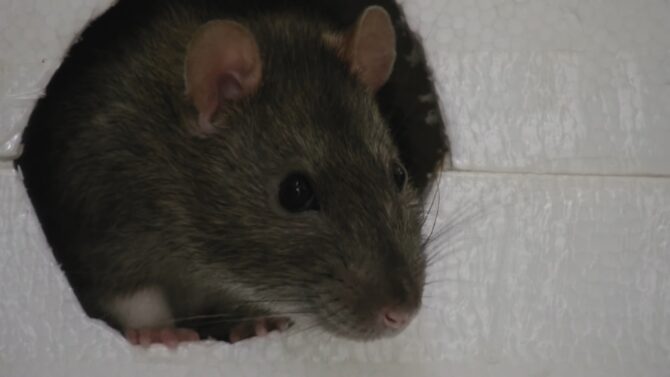Rats: the small, furry creatures that scuttle around in the shadows, often associated with dark alleys and old buildings. But these rodents are much more than just the subjects of urban legends or horror stories.
They are intelligent, adaptable, and have a rich history intertwined with humans. But one question that often comes up is, how long do these creatures live?
All of us are familiar with common rats, but i bet you never heard about the African crested rat, a unique rodent known for its poisonous capabilities.
When we think of rats, we often picture them as fleeting creatures, living in the shadows and fleeting moments of our lives. But how long do they truly live?
And what factors influence their lifespan?
Average Lifespan: A Comparative Analysis
The typical rat, be it wild or domesticated, has a life expectancy of 2 to 3 years. At first glance, this duration might seem rather brief, especially when juxtaposed with longer-lived pets such as dogs or cats.
However, within the rodent realm, this age is quite commendable. To put things into perspective, while a dog might live for a decade or more, many rodents, like hamsters, often live for just 2-3 years.
But rats, being the resilient creatures they are, sometimes defy these norms. There have been remarkable instances where rats, particularly those nurtured in captivity, have surpassed this average, living up to an astounding 7 years.
Such cases, though rare, highlight the potential longevity these creatures can achieve under the right conditions.
Factors Shaping a Rat’s Life
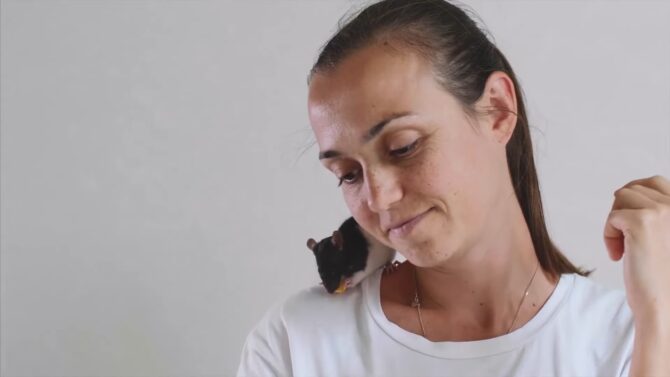
A rat’s life is influenced by a myriad of factors, each playing a pivotal role in determining its longevity. Let’s delve deeper into these determinants:
Nutrition
Nutrition plays a pivotal role in the health and longevity of all creatures, rats included. A diet replete with essential nutrients can significantly bolster a rat’s life expectancy. Rats thrive on a balanced diet, rich in proteins, vitamins, and minerals.
Genetics
Just as some human families might boast several centenarians, certain rat breeds are predisposed to longer lives. The fancy rat is a prime example, often outliving its wild brethren.
Mental Well-being
Mental health, though often overlooked, is paramount. Rats, like humans, are susceptible to stress, anxiety, and depression.
A stimulating environment, replete with toys, mazes, and social interactions, can mitigate these issues, promoting both mental and physical health.
External Threats
Accidents, injuries, parasitic infections, and diseases can abruptly end a rat’s life. Being vigilant, recognizing signs of distress, and seeking timely veterinary care can avert many of these unforeseen tragedies.
The wild is a treacherous place for rats. They constantly grapple with threats from natural predators such as cats, birds, and snakes.
Interestingly, while rats have to be cautious of many predators, some of their natural enemies include owls that like eating rats for deserts.
Diverse Rat Breeds and Their Lifespans
Rats, often seen as mere pests, are in reality diverse creatures with a variety of breeds, each boasting its own unique set of characteristics. Let’s explore some of the most popular rat breeds and understand their lifespans:
1. Fancy Rat: The Classic Choice
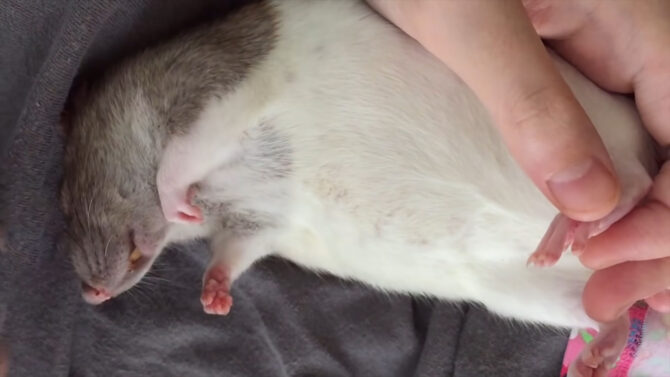
Appearance: The Fancy rat is the quintessential rat breed, often what people picture when they think of rats. They possess a sleek and slender physique, adorned with smooth fur.
Personality: Known for their docile nature, they are often the first choice for novice rat owners.
Lifespan: Typically, Fancy rats have a lifespan of 2-3 years. However, with exceptional care, some have been documented to live up to 7 years.
2. Rex Rat: The Curly Companion
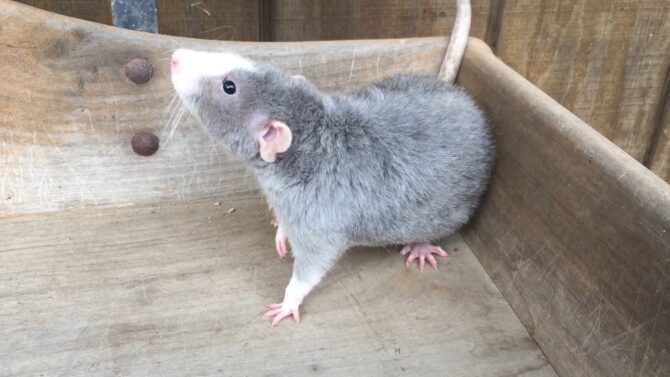
Appearance: The standout feature of the Rex rat is its curly fur, which can range from gentle waves to tight coils.
Personality: These rats are playful dynamos, always on the move and eager to explore.
Lifespan: On average, Rex rats also live for about 2-3 years.
3. Dumbo Rat: The Gentle Giant

Appearance: Their name gives away their defining trait: large, round ears that stand out prominently.
Personality: Dumbo rats are gentle souls, known for their affectionate demeanor, making them great companions.
Lifespan: Their lifespan mirrors that of the Fancy and Rex rats, averaging 2-3 years.
4. Hairless Rat: The Sensitive Soul
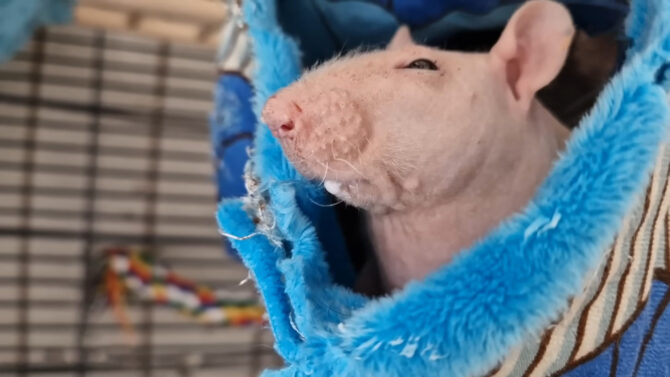
Appearance: As the name suggests, these rats lack fur, showcasing their bare skin, save for a few stray hairs.
Personality: Due to their lack of fur, they are more sensitive, especially to temperature fluctuations, and might seek warmth more often.
Lifespan: Their lifespan is slightly shorter, usually ranging from 1-2 years.
Common Ailments in Rats
Rats, like all creatures, are prone to certain diseases. Some of the most common ailments include:
- Respiratory Infections: Often manifested through symptoms like sneezing or labored breathing.
- Heart Disease: Especially prevalent in older rats, leading to lethargy and breathing difficulties.
- Cancer: Various forms can afflict rats, including tumors in vital organs.
- Diabetes: Recognizable through excessive thirst and urination.
- Parasitic Infections: External parasites can lead to skin issues and discomfort.
Regular vet visits can help in early detection and treatment, ensuring a healthier life for your rat.
Recognizing the Golden Years in Rats
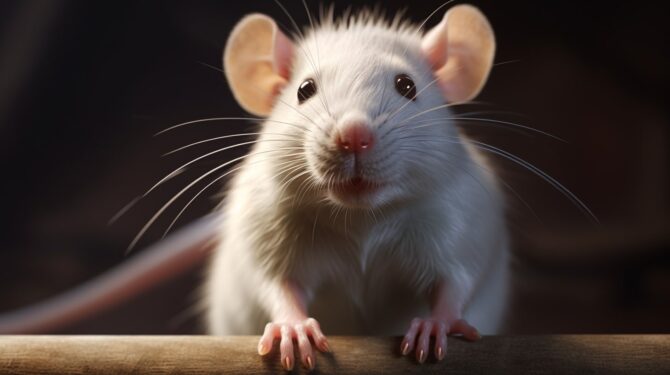
As rats approach their twilight years, certain signs become evident:
- Physical Changes: Reduced activity, weight fluctuations, and fur changes.
- Behavioral Changes: Increased lethargy, reduced grooming, and changes in eating habits.
- Sensory Changes: Diminished sight and hearing capabilities.
Observing these signs warrants a vet visit to ensure their comfort in their senior years.
Maximizing Your Rat’s Lifespan
Rats, with their twitching whiskers and curious eyes, are more than just pets; they’re companions. As with any cherished companion, we want to ensure they live the fullest, healthiest life possible.
If you’re a proud rat parent or contemplating joining the ranks, here’s a detailed guide to help your furry friend thrive:

1. Habitat: Crafting the Perfect Home
- Size Matters: Rats are active creatures, requiring space to explore, climb, and exercise. A spacious cage, preferably multi-leveled, allows them to indulge their natural behaviors. Ensure there’s enough room for toys, hideouts, and resting areas.
- Bedding: Soft, absorbent bedding is crucial. It not only provides comfort but also aids in their burrowing instincts. Opt for non-toxic, dust-free options like recycled paper or aspen shavings. Avoid cedar or pine, as they can be harmful.
- Cleanliness: Regular cleaning prevents the buildup of ammonia from urine, which can lead to respiratory issues. Weekly bedding changes and spot cleaning are recommended.
2. Diet: Nourishing Their Bodies
- Quality Over Quantity: Invest in premium rat pellets. These are formulated to provide all the essential nutrients your rat needs.
- Fresh Foods: Supplement their diet with fresh fruits and vegetables. Broccoli, carrots, apples, and peas are some favorites. Remember to wash them thoroughly and avoid feeding any toxic foods like onions or citrus fruits.
- Treats in Moderation: While it’s tempting to spoil them with treats, moderation is key. Overfeeding can lead to obesity and related health issues.

3. Health: Prioritizing Their Well-being
- Regular Vet Visits: Establish a relationship with a vet experienced in treating rats. Regular check-ups, at least annually, can catch potential health issues before they become severe.
- Observation: Be vigilant. Changes in behavior, eating habits, or appearance can be early signs of health problems.
4. Social Interaction: Catering to Their Social Nature
- Bonding Time: Dedicate time each day for handling and play. This not only strengthens your bond but also provides essential mental stimulation.
- Companionship: Rats thrive in the company of their kind. If possible, consider adopting a pair or group. They’ll keep each other company, groom one another, and play together.
5. Patience: Building Trust
- New Environments: Moving to a new home can be stressful for rats. Give them time to adjust, explore, and get comfortable.
- Gentle Handling: Approach them calmly, speaking in soft tones. Over time, with consistent gentle handling, they’ll learn to trust and even seek out your company.
FAQ
What are some of the common mistakes that people make when caring for rats?
Common mistakes include providing inadequate cage space, inconsistent food and water supply, infrequent cage cleaning, missing vet check-ups, not handling rats often, depriving them of toys and activities, and limiting their social interactions with other rats or humans.
What are some of the things I should do to prepare for getting a rat?
Before getting a rat, educate yourself on rat care, set up a spacious cage with hiding spots, stock up on quality rat food and bedding, find a rat-experienced vet, and ensure you’re ready for the commitment as rats need regular attention and interaction.
What can I do to make my rat happy and healthy?
Provide a clean habitat, offer a nutritious diet, schedule regular vet visits, handle your rat to build trust, give them toys and activities for mental stimulation, and allow social interactions with other rats or humans.
What should I avoid doing when caring for a rat?
Avoid physical punishment, using strong chemicals for cleaning, offering harmful foods or drinks, letting thm roam unsupervised, and isolating them for extended periods.
In Conclusion
Rats, with their keen intelligence and endearing personalities, have a unique way of worming into our hearts. They’re not just pets; they’re family.
By providing them with the right environment, diet, and care, you’re ensuring they lead a life filled with happiness and health. Remember, the love and care you invest in your rat will be returned tenfold in joy, companionship, and memories.
Adopting a rat isn’t just about bringing a pet home; it’s about welcoming a new member into your family.

